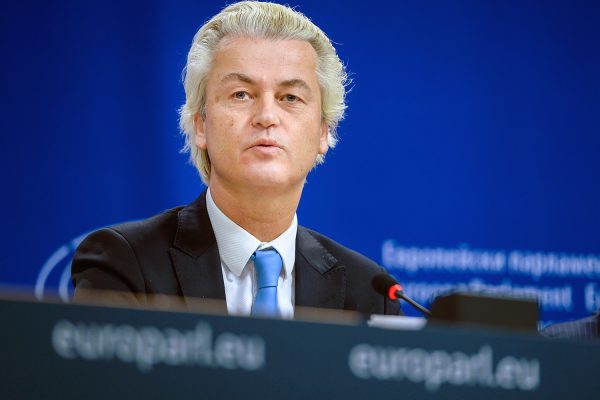
The reason even right-wing parties in the Netherlands have ruled out forming a government with the nativist Freedom Party after the election next month is that they tried to make it work before — and failed.
Polls suggest the anti-EU and anti-immigrant party led by Geert Wilders could become the single largest with around 20 percent support. But it’s unlikely to come to power.
Prime Minister Mark Rutte, whose liberal party is polling in second place, has said there is “zero” chance he will do another deal with Wilders after the Freedom Party leader walked out the last time they worked together.
There may be a lesson here for Republicans in the United States, who think they can co-opt Donald Trump, and Conservatives in Britain, who think they might harness the nationalist passions unleashed by Brexit. The Dutch experience suggests attempts to co-opt populism are unlikely to last and can easily backfire.
Normalizing Wilders
In 2010, the Freedom Party got 15 percent of the votes, making it the third largest after Rutte’s liberals and the center-left Labor Party, both of which got around 20 percent support.
The Christian Democrats, once the dominant political party in the Netherlands, fell into fourth place.
Given Rutte’s victory and the Freedom Party’s high support, up from 6 percent in the previous election, a right-wing government seemed like the logical outcome.
The liberals had few qualms about collaborating with Wilders. They disagreed with him on identity issues and the EU but calculated that his anti-establishment movement could become less of a disruptive force if it was forced to shoulder some responsibility.
The Christian Democrats — needed for a majority on the right — were less sure.
Christians divided
Conservatives from the Catholic south, who had seen many of their voters defect to the Freedom Party, were in favor of an accord, arguing that their own party needed a more reactionary program anyway.
Protestant and progressive leaders vehemently opposed a deal with a man they considered unchristian.
There are parallels with how religious voters in the United States struggled to come to terms with Trump.
As was the case in the Republican primaries last year, the Christian Democrats in the Netherlands eventually came around and endorsed a pact with Wilders. But he wasn’t invited to join the government. His party would only provide parliamentary support for a coalition between the liberals and Christian Democrats.
Betrayal
It worked for a while. The three parties cut spending and tightened immigration and nationalization requirements. At Wilders’ request, elderly care was exempt from austerity.
Whenever Wilders disagreed with the ruling parties, for example on raising the pension age and bailing out Greece, center-left parties, including Labor, were willing to vote with the government instead.
It all came crashing down halfway through the parliament, when a slower than expected recovery necessitated deeper spending cuts. Wilders refused to accept another round of austerity and forced the country to hold snap elections at the very moment its economy was sinking into recession.
Rutte still cites this betrayal to argue that Wilders cannot be trusted.
Pragmatists
Before elections could be held in 2012, Rutte found that other parties, including the liberal Democrats and Greens, were willing to compromise. They made a budget plan that rolled back some of the spending cuts Wilders had supported while raising taxes in order to reduce the deficit.
Rutte’s ability to do deals across the political spectrum will probably be useful again in the next parliament, when he could preside over a coalition of four or even five parties.
Dutch voters often complain that their politicians won’t stand their ground, but they also tend to reward pragmatists.
Wasted vote
Purists like Wilders have their diehard supporters, but not much else to show for their intransigence. Even some of Wilders’ own voters recognize he’s not serious about governing. They only support him to signal their dissatisfaction with the metropolitan elite.
Americans saw something similar with Trump and the British in the EU referendum: voters who didn’t think either would win but supported nativist causes in order to vent their frustrations with the political class.
The Dutch mainstream right tried to co-opt such anti-establishment sentiment and then it turned on them.
Now, rather than appeasing Wilders, they seek to make him less relevant by arguing that a vote for the Freedom Party is certainly wasted.
There is a risk that preemptively excluding the party from power will only confirm the suspicions of its core voters that they are not taken seriously by Dutch elites. Rutte in particular is hoping to prevent that by arguing that some of their grievances are actually justified.
We’ll know in about four weeks if that worked.
